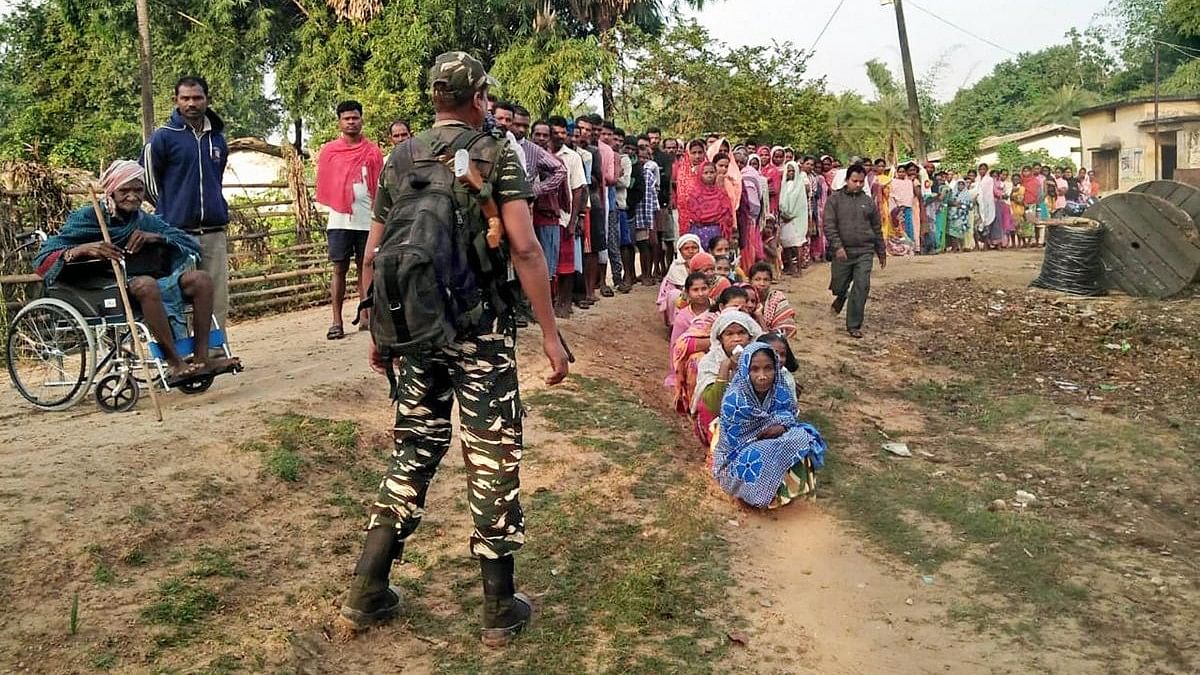
Representative Image from Sukma.
Credit: PTI Photo
Raipur: In a significant move, the Chhattisgarh police have set up a camp in Sukma district's Puvarti village, the native place and stronghold of dreaded Naxalite leader Hidma, who is believed to be the architect of deadly attacks on security forces in the Bastar region.
According to experts, the move is a major achievement for the security forces in their fight against Left Wing Extremism, and setting up a police camp will help psychological warfare against Naxalites.
A joint team of the state police’s special task force (STF), district reserve guard (DRG) and Bastar Fighters, along with the Central Reserve Police Force (CRPF), its elite CoBRA (commando battalion for Resolute Action) and local police set up a camp at Purvati on Friday, said Sundarraj P, Inspector General of Police (Bastar range).
Puvarti, which comes under Jagargunda police station limits, is located along the border of Sukma and Bijapur districts, he said.
Surrounded by dense forests around 150 km away from Sukma district headquarters, Puvarti has been deprived of development works and basic facilities due to the Naxalite menace and its location, the official told PTI.
Notably, it is the native village of Hidma, the former commander of Maoists' PLGA battalion no. 1, and incumbent commander Barse Deva, he said.
The People's Liberation Guerilla Army (PLGA) battalion no. 1 formation has been instrumental in carrying out several deadly attacks in south Bastar.
Last month, Barse Deva took over the command of this formation after Hidma was elevated to the central committee of Maoists, he said.
Senior policemen and CRPF officials, including Sukma Superintendent of Police Kiran G Chavan and Bijapur SP Jitendra Kumar Yadav, have been at the ground to boost the morale of security forces in setting up camps in the interior areas along the inter-district border, the IG said.
"Setting up security camps in remote and heavily Naxalite-affected areas like Puvarti will help thousands of villagers get rid of the Maoist menace and benefit from development works and welfare schemes of the government,” he said.
The IG exuded confidence about positive results in the coming days on the efforts of the Bastar range police, local administration, and security forces.
At least 14 new security camps were set up in the Bastar region since November last year, and of these, six were in Bijapur, seven in Sukma and one in Kanker district, he said.
On January 30, security forces had set up a camp in Tekalgudem, a few kilometres from Puvarti, when an encounter broke out between security personnel and Naxalites. Three CRPF personnel, including two CoBRA commandos, were killed and 17 others injured in the incident.
Sukma district, in extreme south Bastar, lies on the tri-junction of three states — Odisha, Andhra Pradesh and Telangana — with the Maoists dominating the region through an extensive network of 'Janatana Sarkar' units coupled with dreaded guerrilla fighter battalions.
Naxalites have inflicted maximum casualties on security forces in Sukma, including the killing of 76 security personnel in Tadmetla in 2010, in the last one-and-a-half decade.
“The camp in Puvarti is like other strategically important similar facilities in Bastar, but the important thing is that it will have a great psychological impact on the movement as the village belongs to Hidma, and it was his den,” Professor Girishkant Pandey, HoD of Defence Studies at Government NPG College of Science here, told PTI.
Apart from this, the state government’s Niyad Nellanar scheme, under which villages falling within a 5 km radius of a security camp will be developed through camps, will help the police to reclaim the region, he said.
Chief Minister Vishnu Deo Sai had on Thursday announced that his government would launch the 'Niyad Nellanar' (your good village) scheme to ensure basic amenities and benefits of welfare schemes reach villages in Naxalite-affected areas of the state through nearby police camps.
The scheme will help the police keep records of people and families living in Puvarti and other villages near the camp and facilitate basic infrastructure such as schools, health centres, ration shops, anganwadis and mobile network connectivity, Pandey said.